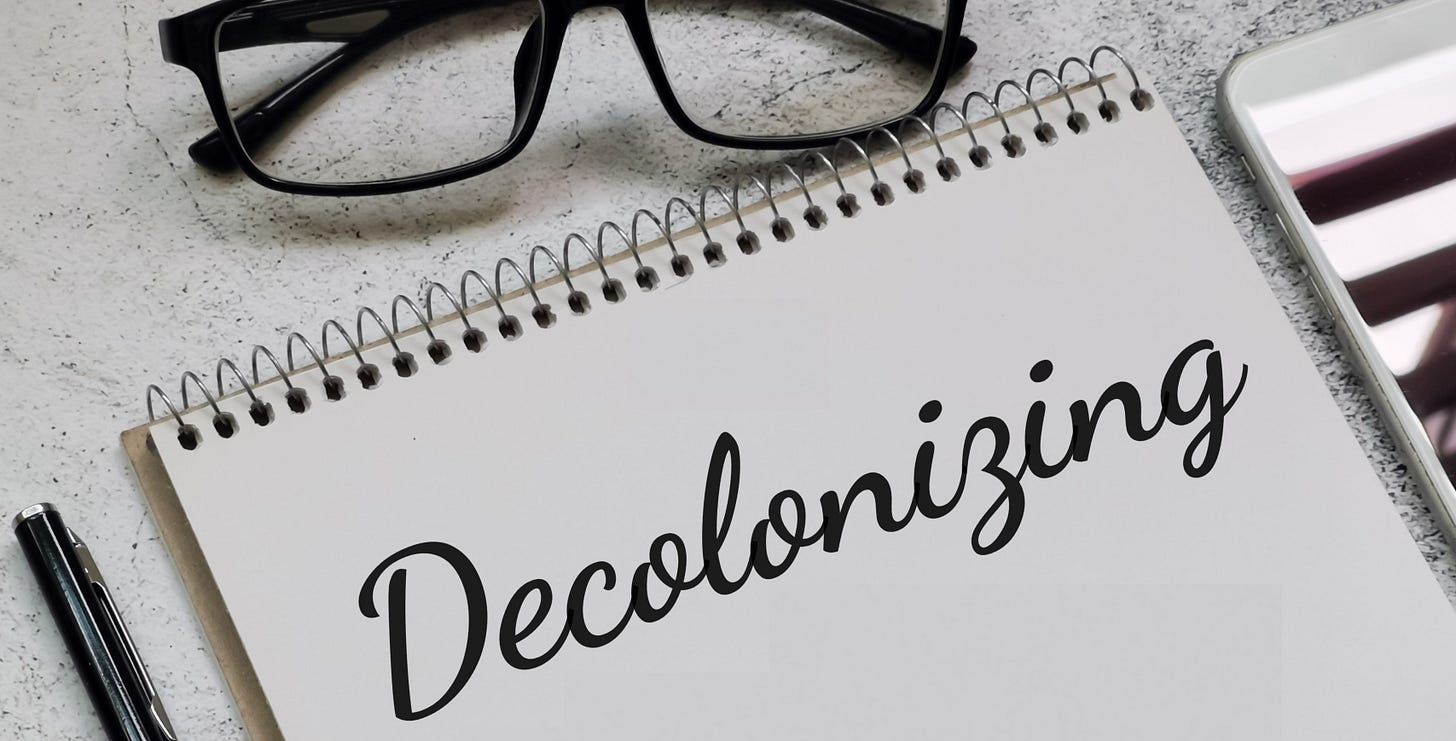E-Pluribus | February 21, 2024
If politics is downstream of culture, we're in trouble; thinking about thinking at college; and 'decolonizing' doesn't really do anyone any good.
A round-up of the latest and best musings on the rise of illiberalism in the public discourse:
Ted Gioia: The State of the Culture, 2024
The year was 1985 when Neil Postman published Amusing Ourselves to Death: Public Discourse in the Age of Show Business. According to Ted Gioia, the Honest Broker, our society may be in the end game of the malady Postman diagnosed. Gioia says not even entertainment is enough anymore.
I want to tell you why entertainment is dead. And what’s coming to take its place.
[. . .]
Until recently, the entertainment industry has been on a growth tear—so much so, that anything artsy or indie or alternative got squeezed as collateral damage.
But even this disturbing picture isn’t disturbing enough. That’s because it misses the single biggest change happening right now.
We’re witnessing the birth of a post-entertainment culture. And it won’t help the arts. In fact, it won’t help society at all.
Even that big whale is in trouble. Entertainment companies are struggling in ways nobody anticipated just a few years ago.
[. . .]
The fastest growing sector of the culture economy is distraction. Or call it scrolling or swiping or wasting time or whatever you want. But it’s not art or entertainment, just ceaseless activity.
The key is that each stimulus only lasts a few seconds, and must be repeated.
It’s a huge business, and will soon be larger than arts and entertainment combined. Everything is getting turned into TikTok—an aptly named platform for a business based on stimuli that must be repeated after only a few ticks of the clock.
TikTok made a fortune with fast-paced scrolling video. And now Facebook—once a place to connect with family and friends—is imitating it. So long, Granny, hello Reels. Twitter has done the same. And, of course, Instagram, YouTube, and everybody else trying to get rich on social media.
This is more than just the hot trend of 2024. It can last forever—because it’s based on body chemistry, not fashion or aesthetics.
Our brain rewards these brief bursts of distraction. The neurochemical dopamine is released, and this makes us feel good—so we want to repeat the stimulus.
[. . .]
This is a familiar model for addiction.
Only now it is getting applied to culture and the creative world—and billions of people. They are unwitting volunteers in the largest social engineering experiment in human history.
So you need to ditch that simple model of art versus entertainment. And even ‘distraction’ is just a stepping stone toward the real goal nowadays—which is addiction.
[. . .]
The tech platforms aren’t like the Medici in Florence, or those other rich patrons of the arts. They don’t want to find the next Michelangelo or Mozart. They want to create a world of junkies—because they will be the dealers.
Addiction is the goal.
[. . .]
But what does this do to our brains? To our lives? To the future?
Here’s where the science gets really ugly. The more addicts rely on these stimuli, the less pleasure they receive. At a certain point, this cycle creates anhedonia—the complete absence of enjoyment in an experience supposedly pursued for pleasure.
[. . .]
Sure, let’s give it a name, something like TikTok depression or Silicon Valley zombification or whatever. The key fact is that users can feel it, even if they don’t have a label or a diagnosis. They feel it even if the technocrats refuse to tell them about it. Just listen to the words people use to describe their toxic online interactions: doomscrolling, trolling, doxxing, gaslighting, etc.
In the year 2024, this is what we do for fun.
But it doesn’t bring happiness. The World Happiness Report surveyed 150,000 people in 26 countries, and found that the US and other prosperous, technologically advanced societies are suffering a massive happiness decline. This is what happens when anhedonia is on sale every week—and the pervasive tech platforms increasingly resemble the ruthless corporation who got rich from opioid abuse.
Some companies get people hooked with pills and needles. Others with apps and algorithms. But either ways, it’s just churning out junkies.
That’s our dystopian future. Not so much Orwell’s 1984—more like Huxley’s Brave New World.
Read it all here.
Caitlin Flanagan: Colleges Are Lying to Their Students
At The Atlantic, Caitlin Flanagan writes that when it comes to colleges’ insistent claims that they teach students how to think, they doth protest too much. Despite that lofty ideal, Flanagan says what colleges do is more telling than what they say, and indoctrination is still the norm in higher education.
If you’ve taken a college tour lately, either as an applicant or as the parent of an applicant, you may have noticed that at some point—usually as you’re on the death march from the aquatic center to the natural-sciences complex—the tour guide will spin smartly on her heel, do the college-tour-guide thing of performatively walking backwards, and let you in on something very important. “What’s different about College X,” she’ll say confidently, “is that our professors don’t teach you what to think. They teach you how to think.”
[. . .]
Each of the guides seems to think this is a point of difference about his or her college, which is itself a sign that they have spent a lot more time in the “what to think” school of higher education than in the “how to think” one. When you’re visiting a college, walk through the corridors of some of the humanities departments. Look at the posters advertising upcoming events and speakers, read the course listings, or just stand silent in front of the semiotic overload of the instructors’ office doors, where wild declarations of what they think and what they plan to make you think will be valorously displayed.
Does this look like a department that is going to teach you how to think?
The truth of the matter is that no one can teach you how to think, but what they can do is teach you how to think for yourself.
[. . .]
A teacher should never do your thinking for you. She should give you texts to read and guide you along the path of making sense of them for yourself. She should introduce you to the books and essays of writers who disagree with one another and ask you to determine whose case is better.
Many college professors don’t want to do that today. They don’t want to “platform” a writer they think is wrong; they don’t want to participate in “both sides-ism.” The same thing is true for the students who pound on the doors of lecture halls and pull fire alarms and throw garbage cans down hallways to protest the 45-minute speech of a visitor.
They believe in sympathetic magic. They believe that words—even those spoken within a lecture hall—will damage them and their classmates. The truth is that they’re scared. They don’t think their ideas can outmatch those of the hated speaker.
[. . .]
In the broadest possible sense, “what’s wrong” with the modern American university is that although it still understands itself to operate under the model established by the 19th-century German university—which emphasized academic freedom, seminars, and laboratories as means of allowing students to discover the truth for themselves—it’s becoming a parody of that model. The professors are going to tell you what to think, and you’re going to backfill that “truth” with research of your own.
Read the whole thing.
Lydia Polgreen: Restoring the Past Won’t Liberate Palestine
The New York Times’ Lydia Polgreen, former Huffington Post editor-in-chief, is by no means one of the paper’s conservative columnists. But Polgreen warns liberals that ranting about decolonization won’t solve anything. History moves in one direction, Polgreen writes, and concerned parties of all ideological stripes must look to the future to resolve conflicts, not attempt to re-litigate the past.
A good deal of the antipathy toward Israeli Jews today is undergirded and enabled, I believe, by something that to some ears sounds progressive: the idea that people and lands that have been colonized must be returned to their indigenous peoples and original state. But that belief, when taken literally, is at best a kind of left-wing originalism, a utopian politics that believes the past answers all the questions of the present. At worst it is a left-wing echo to the ancestral fantasies of the far right, in which who is allowed to live in which places is a question of the connection of one’s blood to a particular patch of soil.
Implicit in the emphasis on indigeneity is a promised restoration, albeit one of a very different sort from the imperial fantasies of Vladimir Putin or the gender obsessions of Ron DeSantis. Decolonization “is not converting Indigenous politics to a Western doctrine of liberation; it is not a philanthropic process of ‘helping’ the at-risk and alleviating suffering; it is not a generic term for struggle against oppressive conditions and outcomes,” as the scholars Eve Tuck and K. Wayne Yang write in an influential academic paper published in 2012, “Decolonization Is Not a Metaphor.”
“The broad umbrella of social justice may have room underneath for all of these efforts,” Tuck and Yang write. “By contrast, decolonization specifically requires the repatriation of Indigenous land and life.”
[. . .]
In theory, decolonization includes the disestablishment of the very idea of land as property, of modern notions like nationhood and citizenship. In theory, it is a chance to do it all over and replay history with the benefit of indigenous ideas and traditions to guide us.
But history doesn’t work that way. People do bad things. Other people resist those bad things. Humans invent and discover; they create and destroy. There is no going backward to some mythic state. There is no restoration. The events that unfold over time shape the land and the people who live on it, and those people shape one another in manifold ways, some brutal and destructive, some generative and loving. But time and experience ensure that nothing can ever be the same as it was before the last thing that happened.
[. . .]
We think understanding the past with hindsight will somehow save us. But what is that hindsight? A perfect knowledge of the past that was not accessible or visible to those experiencing it. Somehow, we believe, the future will be untainted by the passions of the present, and able to see what unfolded more clearly. In practice, it actually works the other way — we see the past through the prism of the present, and often in the blinding light of our hopes for the future, eliding and emphasizing the role of the past as suits our present purpose.
A theory of decolonization that seeks to move backward will inevitably run up against this human tendency. But it also, perhaps unwittingly, strips the formerly colonized of the very self-determination they seek.
Read it all.
Around Twitter (X)
Libraries are not automatically bastions of free speech. The Foundation Against Intolerance & Racism (FAIR) has some suggestions:
With the ouster of Claudine Gay, one might be inclined to think DEI at Harvard is on the run, but at least one alumni group is not ready to surrender. Via Chris Brunet.
And finally, Steve Hayes is skeptical about the results of a poll on citizens’ confidence in Congress. Pretty soon, the bar will be sitting on the ground.










